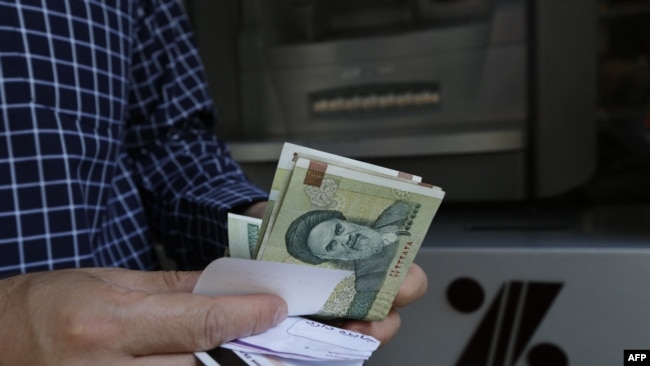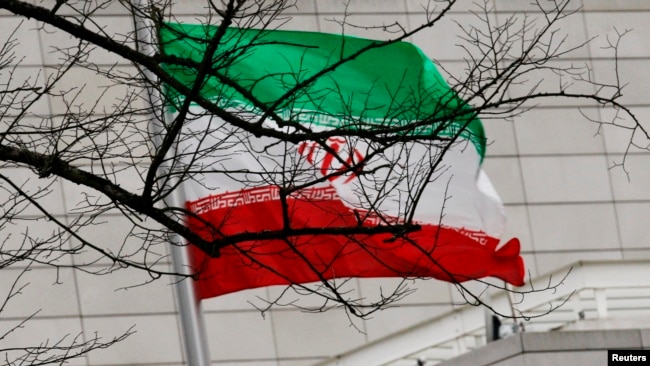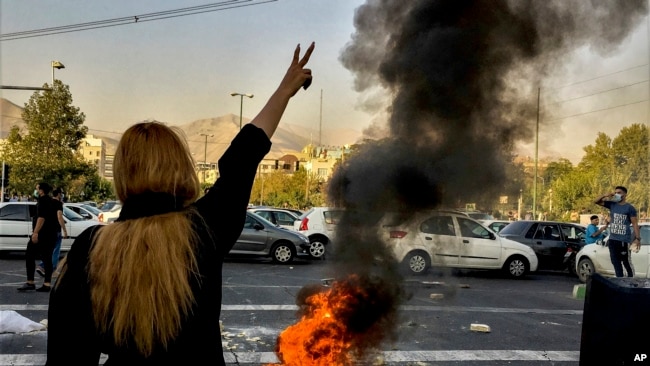Welcome back to The Farda Briefing, an RFE/RL newsletter that tracks the key issues in Iran and explains why they matter. To subscribe, click here.
I'm RFE/RL correspondent Golnaz Esfandiari. Here's what I've been following during the past week and what I'm watching for in the days ahead
The Big Issue
Iran's national currency, the rial, plummeted to new record lows on the country's unregulated market over the weekend, trading for 601,500 to the dollar, its lowest-ever rate. On February 28, the rial stood at 569,000 against the U.S. dollar, according to the foreign-exchange site Bonbast.com.
Iranian authorities have blamed the currency's fall on alleged attempts by the country's enemies to destabilize the Islamic republic amid several months of antiestablishment protests sparked by the September death in police custody of 22-year-old Mahsa Amini.
"After the enemy failed in its plans in the streets...it naturally heightened its pressure on the economy," government spokesman Ali Bahadori Jahromi told journalists on February 28, adding that some people allegedly behind the fall of the national currency inside the country had been arrested.
Why It Matters: The fall of the national currency, which has lost about 50 percent of its value since the beginning of the nationwide antiestablishment protests, comes amid Iran's international isolation over its brutal crackdown against demonstrators, controversial nuclear activities, and Tehran's deepening military ties with Russia, including the transfer of combat and suicide drones to boost Moscow's unprovoked war against Ukraine.
What's Next: The fall of the national currency has led to public anger among Iranians, who are already struggling to make ends meet amid soaring food prices. In recent days, many have attempted to purchase dollars at exchange offices to protect their savings, while steelworkers, firefighters, bakers, and retirees in Tehran and other cities have openly complained about rising inflation and skyrocketing prices. The deteriorating economic situation could lead to more protests, adding pressure on the establishment.
Stories You Might Have Missed
- Health Minister Bahram Eynollahi said on February 28 that "a mild poison" was the cause of the mass illnesses of schoolgirls in Iran. Eynollahi was quoted by state media as saying that determining the origin of the unnamed poison was not within the scope of his ministry. His comments came amid increased public concern over a wave of sickness that has struck some 30 girls' schools in the religious city of Qom since late November. Authorities have suggested that the incidents could be intentional, fueling allegations that religious extremists or anti-regime groups could be responsible.
- Iranians are mourning the death of Pirouz, a 10-month-old Asiatic cheetah cub born in captivity in Iran, and many are blaming authorities for failing to save him. Pirouz ,who died of kidney failure this week in a veterinary hospital in Tehran, had become a symbol of national pride and hope for the millions of Iranians who closely followed updates about his progress and shared images of him online. Two of the cub's littermates died within days of their birth in late April, but Pirouz, which means "victorious," had survived and given hope for a critically endangered species. Pirouz and growing concerns about the survival of Asiatic cheetahs in Iran were highlighted in the lyrics of Baraye, a Grammy-winning song written by Shervin Hajipour that became the anthem of the Iranian protest movement.
What We're Watching
Inspectors from the International Atomic Energy Agency (IAEA) have found uranium particles enriched up to 83.7 percent in Iran's underground Fordow nuclear site, a confidential report seen by Western news agencies said. "The report said that "discussions between the agency and Iran to clarify the matter are ongoing." The level of enriched uranium discovered is just short of the 90 percent needed for the production of nuclear weapons.
What's Next: The finding is likely to increase tensions over Iran's sensitive nuclear activities, which the country has expanded in past months. Tehran has maintained that it has not enriched uranium above 60 percent and that its nuclear program is for civilian purposes only, while acknowledging that "unintended fluctuations" during the enrichment process "may have occurred."
Kelsey Davenport, the director for nonproliferation policy at the U.S.-based Arms Control Association, said the discovery highlighted the need for additional monitoring of Iran's nuclear program. "Unlikely but not impossible that the 84 percent enriched particles were an accident. But by accident or intention, this incident underscores the critical need for additional monitoring & transparency," she said on Twitter.
The IAEA report follows comments by CIA chief William Burns, who said over the weekend that Iran's nuclear program had "advanced very far, to the point where it would only be a matter of weeks before they can enrich to 90 percent, if they chose to cross that line." Burns, however, added that Iranian Supreme Leader Ayatollah Ali Khamenei had apparently not made a decision on resuming the country's "weaponization program that we judge they suspended or stopped at the end of 2003."
That's all from me for now. Don't forget to send me any questions, comments, or tips that you have.
Until next time,
Golnaz Esfandiari
If you enjoyed this briefing and don't want to miss the next edition, subscribe here. It will be sent to your inbox every Wednesday.
https://www.rferl.org














